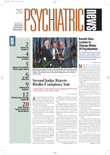The reward of a euphoric response to alcohol that most people experience is known to be related to the release of stress hormones. A new study suggests that people who are alcoholic may actually drink alcohol for its apparent ability to help correct a dysfunctional stress response.
The study reported two significant findings: First, some patients recovering from alcoholism, even after prolonged abstinence from alcohol, continue to have a significantly suppressed stress-response system. Secondly, their systems appear to be hypersensitive to serotonin. The study is described in the May issue of Alcoholism: Clinical and Experimental Research.
According to the authors, some patients who are alcoholic respond differently from nonalcoholic patients to stressful situations that involve the brain’s serotonin system and may drink alcohol under stressful conditions in order to “correct” their brain’s response to the stress.
Subjects recovering from alcoholism were given fenfluramine to cause an acute increase in serotonin activity. This was then suspected of causing increased activity in the subjects’ limbic-hypothalamic-pituitary-adrenal (LHPA) axis—the system of interconnected brain structures that becomes especially active in response to stress—leading to secretion of the stress hormone cortisol by the adrenal glands.
“Our major finding,” said researcher Robert M. Anthenelli, M.D., “was that alcoholics who had been abstinent for an average of more than four months had a twofold greater cortisol response compared with nonalcoholics following administration of fenfluramine.” Anthenelli, the study’s lead author, is an associate professor of psychiatry at the University of Cincinnati College of Medicine and director of substance dependence programs at the Cincinnati Veterans Affairs Medical Center.
He said the finding is surprising in that it contrasts with most other published reports indicating a blunted or unchanged stress response in patients who are alcoholic, with shorter periods of abstinence.
“We also found that the stress-hormone response in recovering alcoholics did not return to baseline levels as quickly as it did in age- and race-matched nonalcoholic control subjects. In other words, it appears that some of our recovering alcoholics had difficulty turning off the fenfluramine-induced stress response.”
While the authors did not directly speculate on the implications of the findings, other researchers have. “It is reasonable to speculate,” said Stephen Woods, M.D., professor of psychiatry and of neuroscience at the University of Cincinnati, “that there are physical consequences of this.” Whether the change in the LHPA axis is the result of prior brain differences or is a consequence of former consumption of large amounts of alcohol isn’t yet known, Woods said in a press release issued by the National Institute on Alcoholism and Alcohol Abuse.
“An interesting clue, however,” Woods suggested, “is that the elevated cortisol response is reminiscent of what has been observed in individuals who have never before experienced alcohol, but who are considered at high risk for developing alcoholism. One possibility, therefore, is that the prolonged elevation of cortisol following fenfluramine is characteristic of certain alcoholism-prone individuals and can be observed either before they ever drink or after a prolonged period of abstinence.”
“We propose,” said Anthenelli, “that this may represent a trait marker of alcoholism . . .that could distinguish subgroups of alcohol-dependent people or those who have a predisposition for alcoholism from people who do not.”
Woods thinks that the findings may suggest that the reason some people drink more alcohol and eventually become alcoholic “is that a ‘defect’ in their LHPA response to serotonin is ‘corrected’ by alcohol. If this were the case, then alcohol would have a greater degree of reward value for those individuals than for people who do not have the same ‘defect.’ ”
“Stress Hormone Dysregulation at Rest and After Serotonergic Stimulation Among Alcohol-Dependent Men With Extended Abstinence and Controls” can be accessed on the Web at www.alcoholism-cer.com by entering “Anthenelli” under “Author.” ▪
